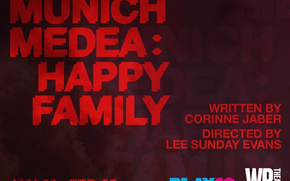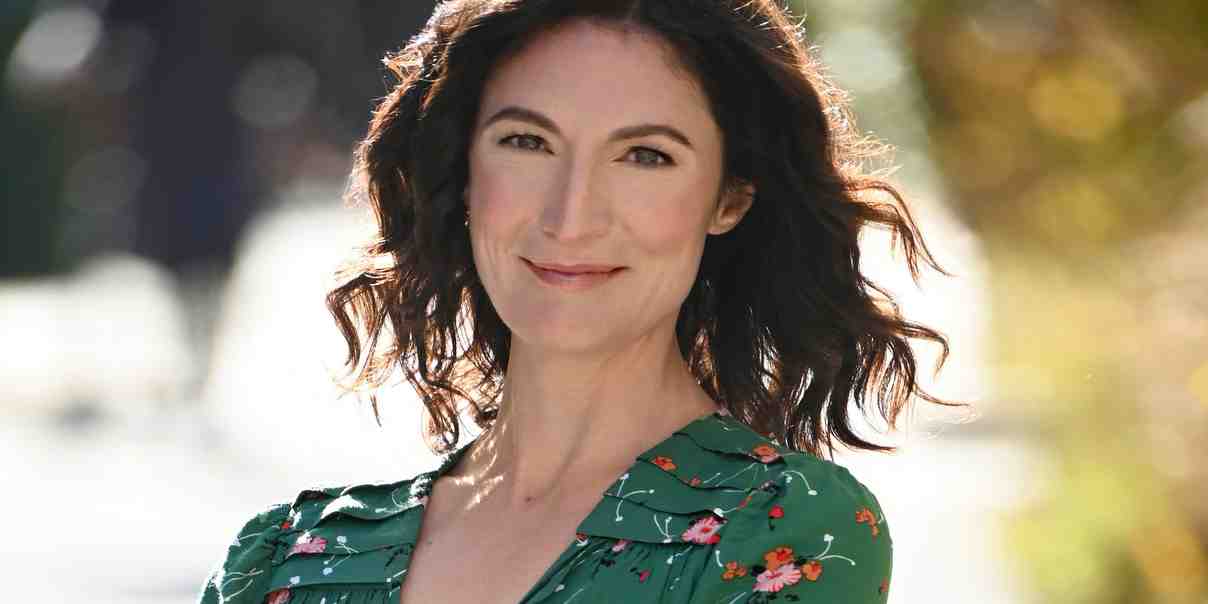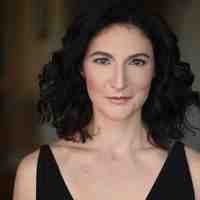

MUNICH MEDEA and Rhetorical Power
Meet the Participants

Carla Kissane (she/hers) is an Australian-born, NYC-based actor / singer / audiobook narrator whose passion is solo performance of Shakespearean cabaret: shakespeareancabaret.com. Currently working on solo show PETTY TYRANT (made possible by the New York State Council on the Arts with the support of the Office of the Governor and the New York State
Legislature). Recent work includes Unbecoming and Whores & Weeping Women, and the title role in Medea, directed by Miriam Grill. Notable Australian productions include Sondheim's Saturday Night (Australian Premiere), six shows with the Australian Shakespeare Company, and Motherhood The Musical (National Tour). AEA / SAG-AFTRA. https://www.carlakissane.com
Medea is one of those plays that just screams ‘mother’, don’t you think?
And yet, in MUNICH MEDEA: HAPPY FAMILY, it is the mother who is absent from the play. As an audience member, I couldn’t help but feel the events recounted wouldn’t have been possible if we as an audience had been faced with a living, breathing Medea mother treading the boards. And that, of course, is the point–isn’t it?
When women’s voices are silenced, disrespected, absent – there is always trouble afoot.
Medea came into my life as a scene-study in 2016, just before my green card interview. I’d spent my adult life as a fiercely independent actor and theatermaker, raised by a strong woman to use words to speak my truth, and felt suddenly and irrevocably vulnerable as a grown woman dependent upon lawyer and husband to argue my validity and right to residency. In 2019, by then a permanent resident of the USA, I played the title role in Miriam Grill’s production of Medea and wondered how the world would break. It did, in 2020 - in ways I couldn't have imagined. Since then, I’ve switched from playing vengeance-seeking-demi-goddesses to clowns. The job of the clown is to speak truth to power. This is quite the mission statement, and requires a rhetorical skill that I don’t even think Medea prepared me for.
In MUNICH MEDEA: HAPPY FAMILY, we are confronted with a triangulation of characters - a father, a daughter, and the daughter’s best friend… all using rhetorical argument and speaking directly to the audience to convince us of the validity of their point of view.
In Euripides’ play, Medea–granddaughter of the Sun God, Helios–is cast aside by her husband Jason in favor of a more politically advantageous marriage to a younger woman (who just happens to be the King’s daughter). This despite killing a serpent and delivering the Golden Fleece to Jason, killing several of her own family members, and fleeing with Jason as refugees. Offered safe harbor by the King of Corinth, Medea and Jason settle and raise two children, after which follows a decade of belonging in a new city.
Jason betrays her and the Corinthian King orders Medea into exile on pain of death, fearing retribution from the famous sorceress. She begs a favor – a day’s reprieve. Then, she hatches a plan to escape retaliation in Athens before enacting her revenge – killing the King, his daughter, and her own two sons before calling on her grandfather’s chariot drawn by dragons (ever heard of deux ex machina, the machine of God?) and escaping off into an Athenian future to start a new life.
Medea skillfully wields rhetorical power over the chorus of Corinthian wives (i.e. the audience), who are asked to bear witness to her revenge, and keep silent no matter what.
“As you watch my plans for justice unfold, keep them secret, that’s all I ask.”
We swear our silence, and the charm’s almost wound up. When visitor Aegeus agrees to offer safe harbor in Athens in exchange for a favor, there are no more obstacles to the act of revenge that could stop Medea’s purpose. The God that governs Oath-keeping has already been invoked – so we’ll keep our word. Also, as Medea reminds us:
“Don’t you know, gods are deaf to oath breakers and to those who deceive their guests.”
There are ancient laws of hospitality towards those who seek refuge, and keeping one’s promise, that translate to violations of grave consequences in the world of Medea.
In MUNICH MEDEA we hear Jason’s argument:
FATHER (as Jason):
I must, it seems, practice my rhetorical skills,
and, like the skillful captain of a ship,
shortening my sails, outrun
the blasts of your tongue-lashing, woman.
You are the one who turned our discussion into a contest.
Now the reproaches you heap on my royal marriage,
here I will prove first that I did the smart thing
and showed good sense and finally that I am a great benefactor
to you and my children. Let me finish.
Yes, it’s a doozy. Jason is attempting to convince us he’s providing a better life for his family by exiling his wife and children because they’d be less than citizens as bastards from a previous marriage under Corinthian law. To Jason, the choice of a younger Corinthian princess in favor of his semi-Divine, Barbarian wife of ten years is an act of self-sacrifice..
And what about these suddenly illegitimate children?
Well, even the offspring of demigoddesses are vulnerable when they obtain refugee status. Medea is a barbarian, an outsider, Other. But she is also Divine.
In MUNICH MEDEA, Alice recounts:
You speak such good German / I just say / So do you / And smile approvingly / To show how much I appreciate their good German / It took me 20 years to learn this line
I sat up with fire in my belly at hearing these words spoken aloud. I felt like the only person in the theater. They could be mine. To explain…After 8 years into expat life, here’s how every new conversation goes:
Hi, I’m Carla.
KAH-LA?
No, (sigh, american accent) Ca-rrrrrrrr-la
OH YOU MEAN CAR-LA! (Like I’ve made a mistake in pronouncing my own name, and have finally got it right).
I LOVE YOUR ACCENT!
Thanks, I take it everywhere.
It took me 6 years to learn this line.
I think belonging is a kind of power. As a white, cisgender, heterosexual Australian immigrant here, I pass in all the ways that engender privilege. Except for my accent, of course – and even that can be a choice. I’m an actor. I have a decent ‘general American’ (whatever THAT is) that I can whip up anytime to render my culture invisible.
I’m not judged or categorized on sight, but on sound.
I can choose to sound authentic - which will immediately Other me. Or I can choose to be a code-shifter, invisible - a kind of passivity in belonging. It is a privilege, and a choice, and after eight years of microdecisions, moment-by-moment, I’m still dancing between conditional belonging and authentic speech.
When Jason finds out his sons are dead, Medea declaims, mid-flight, from atop her chariot:
“If it’s me you’re after, speak.
Tell me what you want.
Only words can reach me.”
In MUNICH MEDEA, it is the words which reach us. Words are wielded for all their transformative and manipulative power. Yet Caroline’s mother is silent, inert, asleep. This play should be about her – declares Caroline. But it is her absence that speaks volumes. Silence is violence and words are weapons, in this world – and perhaps in our world, too.
My own mother has been a significant role model who taught me the value of powerful speech. When she said something aloud, she never backed down. She always meant it. I was always a little awed, a little resentful, and ultimately grateful for the way her words matched her actions. I now think of it as a superpower.
At the tender age of 6, my poor little mother had packed a suitcase and made her way to the school Principal’s office, ready to hold an adult’s actions to account. The Principal and his wife laughed in her face and sent her back with cookies. There is a way that laughter can harm, as well as heal. There is a hospitality that truly welcomes, and one composed of sugar – which can be poison.
There were people we didn’t speak to when I was growing up. I resented this, but I also knew why – because a role model had told me why, using words, that there was behavior that required protection from harm.
We kept our boundaries and maintained distance throughout our childhood and teenage years. There is a silence that is violence, and a silence that protects. As you watch my plans for justice unfold, keep them secret, that’s all I ask.
One day in my early adulthood, a message was delivered by proxy - that my mother had ‘suffered a terrible injustice’. I guess this was an attempt at apologizing.
Medea is wronged, and instead of accepting defeat, breaks the world. I grew up to be an actor, and I never knew the familial travesties that Alice and Caroline face in MUNICH MEDEA: HAPPY FAMILY because in many ways, my role models taught me how to use my words to speak truth to power, to insist on holding those in power to account, and to understand the difference between silence and consent. My mother’s last name can be translated to mean ‘poor’ in some languages, yet in another it signifies ‘powerful'.
This piece should be about her.
Notes: Euripides’ Medea quotes from a translation by Michael Collier and Georgia Machemer.
Related Productions

Written by
Carla Kissane